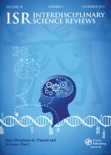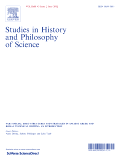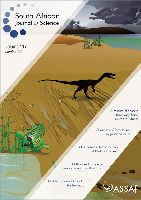
INTERDISCIPLINARY SCIENCE REVIEWS
metrics 2024
Unveiling New Perspectives on Science.
Introduction
INTERDISCIPLINARY SCIENCE REVIEWS, published by SAGE Publications Inc, is a prominent journal that serves as a pivotal platform for the convergence of insights across various domains, including the history and philosophy of science, interdisciplinary studies, and social sciences. Established in 1976 and continuing its legacy through 2024, this esteemed journal actively promotes innovative research and critical discussions, earning it a commendable Q2 ranking in key categories such as History and Philosophy of Science and Multidisciplinary, reflecting its influential contributions within the academic community. With a solid impact factor that highlights its relevance, INTERDISCIPLINARY SCIENCE REVIEWS is dedicated to fostering access to cutting-edge scholarship, although it currently does not offer open access options. The journal’s noteworthy rankings in Scopus further affirm its standing, making it an essential resource for researchers, professionals, and students seeking to explore interdisciplinary approaches to complex scientific inquiries.
Metrics 2024
 0.29
0.29 1.00
1.00 1.00
1.00 30
30Metrics History
Rank 2024
Scopus
IF (Web Of Science)
JCI (Web Of Science)
Quartile History
Similar Journals

JOURNAL OF THE HISTORY OF BIOLOGY
Documenting the Interplay of Science and SocietyJOURNAL OF THE HISTORY OF BIOLOGY, published by Springer, stands as a vital academic resource devoted to examining the historical development of biological science and its philosophical dimensions. This esteemed journal, which has been in continuous publication since 1968 and encompasses research through 2024, is recognized for its significant contributions to the fields of Agricultural and Biological Sciences, and the History and Philosophy of Science, proudly holding a Q2 ranking in both categories as of 2023. With an ISSN of 0022-5010 and an E-ISSN of 1573-0387, it serves a diverse audience of researchers, professionals, and students interested in the interplay between biological advancements and historical context. The journal’s particular emphasis on interdisciplinary investigation provides a platform for innovative scholarship that enriches our understanding of not only the science itself but also its societal implications. While it does not currently offer open access, the rigor and reputation of the journal underscore its importance as a leading publication in the academic landscape of biological history.

STUDIES IN HISTORY AND PHILOSOPHY OF SCIENCE
Unraveling the Philosophical Threads of Scientific EvolutionSTUDIES IN HISTORY AND PHILOSOPHY OF SCIENCE, published by Elsevier Science Ltd, is a leading academic journal dedicated to the exploration of historical and philosophical dimensions of science. With both an ISSN of 0039-3681 and E-ISSN of 1879-2510, this esteemed journal has established itself as a pivotal resource since its inception in 1970 and continues to publish cutting-edge research reflecting the evolution of scientific thought. Situated in the United Kingdom, it is recognized for its high-impact contributions, boasting a Q1 ranking in both History and History and Philosophy of Science categories as of 2023. Researchers in the humanities will benefit from the journal’s rigorous analysis and insightful discussions, as evidenced by its competitive Scopus rankings—placing it in the 96th and 83rd percentiles in their respective fields. Although not an open-access journal, it maintains a commitment to scholarly excellence, aiming to foster a deeper understanding of the interconnections between historical context and philosophical inquiry in the scientific domain, making it an invaluable resource for students, professionals, and researchers alike.

Prometeica-Revista de Filosofia y Ciencias
Cultivating Insightful Conversations on Contemporary IssuesPrometeica-Revista de Filosofia y Ciencias, published by LUCAS EMMANUEL MISSERI in Argentina, serves as a pivotal platform in the realms of philosophy and the history of science since its establishment in 2010 as an Open Access journal. With an ISSN and E-ISSN of 1852-9488, this journal not only emphasizes accessibility but also engages a diverse audience encompassing researchers, professionals, and students eager to explore the intersections of philosophical inquiry and scientific understanding. As of 2023, Prometeica boasts a commendable Q2 ranking in Philosophy and a Q3 ranking in the History and Philosophy of Science, reflecting its growing influence in academic discourse. Despite its rising status, with Scopus rankings indicating a niche yet dedicated readership, the journal remains committed to fostering innovative dialogue and critical thought in the philosophical community. This strategically positioned journal invites contributions that not only advance theoretical perspectives but also address contemporary issues within the philosophical and scientific domains, ensuring relevance and impact for its readers.

Spontaneous Generations-Journal for the History and Philosophy of Science
Advancing Knowledge at the Crossroads of Science and PhilosophySpontaneous Generations: Journal for the History and Philosophy of Science is a dedicated publication focusing on the rich fields of history and philosophy within the scientific domain. Published by the Institute for the History and Philosophy of Science and Technology, this journal provides a vital platform for scholars, researchers, and students to explore and disseminate ideas that bridge the historical context and philosophical inquiries of scientific practices. With its commitment to open access, Spontaneous Generations ensures that groundbreaking research is widely available, fostering an environment of collaboration and knowledge sharing. Aiming to engage a diverse audience, this journal is pivotal for those looking to understand the evolution of scientific thought and its implications on contemporary issues, making it an essential resource in the academic community.

Momona Ethiopian Journal of Science
Nurturing Ideas that Shape the Scientific LandscapeMomona Ethiopian Journal of Science is a distinguished open-access journal that has been fostering scholarly communication in the realm of natural and computational sciences since its inception in 2009. Published by the Mekelle University, College of Natural and Computational Sciences, this journal provides a platform for researchers, professionals, and students to disseminate their findings, share innovative ideas, and engage with cutting-edge developments within the field. With its ISSN 2073-073X, the journal aims to enhance scientific discourse by welcoming high-quality manuscripts that address a variety of topics relevant to the Ethiopian and broader scientific communities. Although specific metrics like HIndex and Scopus rankings are currently unavailable, Momona’s commitment to open access ensures that its content is readily accessible, promoting a collaborative atmosphere conducive to research advancement. Located in Mekelle, Ethiopia, this journal not only contributes to local knowledge production but also aligns with global academic trends that emphasize accessibility and interdisciplinary collaboration.

OSIRIS
Cultivating Scholarly Insight in the HumanitiesOSIRIS, published by the University of Chicago Press, is a distinguished journal focusing on the dynamic intersection of Cultural Studies and the Arts and Humanities. With an established history dating back to 1985, the journal has undergone several converged publication years, reflecting its evolution and commitment to addressing contemporary topics in these fields. OSIRIS holds a reputable position with an impact factor that places it in the Q2 category for Cultural Studies and Q3 for Arts and Humanities (miscellaneous) as of 2023, signifying its influence and scholarly contribution. Researchers and academics will appreciate its rigorous peer-reviewed articles, which aim to advance understanding and foster dialogue around critical socio-cultural issues. While OSIRIS does not currently offer open access, it remains a vital resource for those engaged in the pursuit of knowledge across the arts and humanities spectrum, positioning itself as an essential platform for scholarly discourse from its home base in Chicago, United States.

European Journal for Philosophy of Science
Connecting Ideas, Inspiring Innovation in Scientific PhilosophyThe European Journal for Philosophy of Science, published by SPRINGER, stands as a prestigious platform for scholars in the realms of philosophy and history of science. With an impressive impact factor and categorized in the Q1 Quartile for both History and Philosophy of Science and Philosophy, this journal ranks among the top 10% of its peers, reinforcing its critical role in advancing academic discussions and insights within these fields. With its composition of rigorous peer-reviewed articles and a commitment to fostering interdisciplinary dialogue, the journal navigates foundational and contemporary issues that shape scientific inquiry. Although currently not Open Access, it provides invaluable access to researchers, professionals, and students who seek to deepen their understanding of the philosophical underpinnings of scientific practice. Housed in the Netherlands, the journal continuously engages with the evolving landscape of philosophy in the scientific domain, making it a key resource for anyone invested in the intersection of science and philosophy.

SOUTH AFRICAN JOURNAL OF SCIENCE
Exploring the Depths of Scientific InquiryThe SOUTH AFRICAN JOURNAL OF SCIENCE, published by the Academy of Science of South Africa (ASSAf), is a prestigious open-access journal dedicated to the advancement and dissemination of scientific knowledge across various disciplines. Since its inception in 1973, the journal has played a pivotal role in fostering scientific communication within South Africa and beyond, ranking in the Q2 and Q3 quartiles across critical categories such as Agricultural and Biological Sciences, Biochemistry, Genetics and Molecular Biology, and Earth and Planetary Sciences as of 2023. With an ISSN of 0038-2353 and E-ISSN 1996-7489, this journal embraces modern publishing practices, having adopted an open-access model in 2009, which ensures that research is readily accessible to a global audience. The journal aims to promote interdisciplinary research and facilitate collaboration among scientists, making it an essential resource for researchers, professionals, and students eager to contribute to and learn from the dynamic landscape of scientific inquiry. For further information, collaborators and correspondents may reach out to the journal through its contact address: PO BOX 72135, LYNWOOD RIDGE 0040, SOUTH AFRICA.

History of Geo- and Space Sciences
Bridging the gap between history, philosophy, and geo-sciences.History of Geo- and Space Sciences is a distinguished open-access journal published by COPERNICUS GESELLSCHAFT MBH since 2010, committed to advancing knowledge in the interdisciplinary fields of Earth and planetary sciences as well as the history and philosophy of science. Based in Germany, this journal operates under ISSN 2190-5010 and E-ISSN 2190-5029, providing a platform for researchers, professionals, and students to disseminate and access high-quality scholarly articles. With a remarkable impact reflected in its 2023 Scopus rankings, placing it in Q3 for Earth and Planetary Sciences (miscellaneous) and Q2 for History and Philosophy of Science, the journal plays a crucial role in fostering dialogue and collaboration among the scientific community. It not only covers significant advancements in geo-sciences but also addresses historical perspectives and philosophical inquiries that shape our understanding of the discipline. Engage with groundbreaking research and broaden your insights by contributing to or reading articles from this pivotal journal.

NanoEthics
Exploring the Ethical Frontiers of NanotechnologyNanoEthics is a pioneering journal published by Springer, dedicated to exploring the complex intersections of nanotechnology and ethical considerations. With an ISSN of 1871-4757 and an E-ISSN of 1871-4765, this influential journal has steadily progressed since its inception in 2007, sustaining high academic standards and relevance through 2024. It is notably positioned in the Q1 category for History and Philosophy of Science and Philosophy, reflecting its significant impact in these disciplines, and holds commendable rankings in several other categories, including Social Sciences and Management of Technology and Innovation. With its commitment to fostering rigorous dialogues and interdisciplinary research, NanoEthics serves as an essential platform for researchers, professionals, and students engaged in understanding the socio-ethical dimensions of nanoscience. The journal's comprehensive scope invites contributions that challenge conventional paradigms, encouraging innovative thought leadership in the realms of technology and ethics.